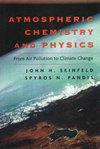跨界污染在中国未来空气质量和健康改善中的作用被低估
IF 5.2
1区 地球科学
Q1 ENVIRONMENTAL SCIENCES
引用次数: 1
摘要
摘要评估中国未来空气质量目标可实现性的研究集中在减少中国国内排放的作用上,但外国来源的越境污染的影响在很大程度上被低估了。在这里,我们评估了外国越境污染的未来变化将在多大程度上影响中国2030年和2060年空气质量目标的实现。我们发现,到2030年,在中国目前的政策情景下,中国人口加权PM2.5的跨界贡献将减少29 % (1.2 µg m−3)随着外国从化石燃料密集型向低碳转型。到2060年,这一差距将增加到45 % (1.8 µg m−3)。在国外采用低碳而非化石燃料密集型途径将防止1000万中国人接触到高于中国环境空气质量标准的PM2.5浓度(35 µg m−3),使500万中国人免受PM2.5浓度超过世界卫生组织空气质量指南(5 µg m−3)。同时,中国采用碳中和的途径,而不是目前的途径,也将有助于减少由国外运输和本地排放污染物之间的化学相互作用产生的越境PM2.5。2060年,在中国和外国同时采用低碳道路将防止63 % 跨界污染和386 000例相关的过早死亡,相对于在这两个地区采用化石燃料密集型途径而言。因此,在制定未来空气质量预期和污染缓解策略时,应仔细考虑跨界污染的影响。本文章由计算机程序翻译,如有差异,请以英文原文为准。
The underappreciated role of transboundary pollution in future air quality and health improvements in China
Abstract. Studies assessing the achievability of future air quality goals in China have focused on the role of reducing China's domestic emissions, yet the influence of transboundary pollution of foreign origins has been largely underappreciated. Here, we assess the extent to which future changes in foreign transboundary pollution would affect the achievability of air quality goals in 2030 and 2060 for China. We find that in 2030, under the current-policy scenario in China, transboundary contributions to
population-weighted PM2.5 in China would be reduced by 29 % (1.2 µg m−3) as foreign countries transition from the fossil-fuel-intensive to the low-carbon pathway. By 2060, the difference would be increased to 45 % (1.8 µg m−3). Adopting the low-carbon instead of the fossil-fuel-intensive pathway in foreign countries would prevent 10 million Chinese people from being exposed to PM2.5 concentrations above China's ambient air quality standard (35 µg m−3) in 2030 and 5 million Chinese people from being exposed to PM2.5 concentrations above the World Health Organization air quality guideline (5 µg m−3) in 2060. Meanwhile, China adopting the carbon-neutral pathway rather than its current pathway would also be helpful
to reduce transboundary PM2.5 produced from the chemical interactions
between foreign-transported and locally emitted pollutants. In 2060,
adopting a low-carbon pathway in China and foreign countries coincidently
would prevent 63 % of transboundary pollution and 386 000 associated
premature deaths in China, relative to adopting a fossil-fuel-intensive
pathway in both regions. Thus, the influence of transboundary pollution
should be carefully considered when making future air quality expectations
and pollution mitigation strategies.
求助全文
通过发布文献求助,成功后即可免费获取论文全文。
去求助
来源期刊

Atmospheric Chemistry and Physics
地学-气象与大气科学
CiteScore
10.70
自引率
20.60%
发文量
702
审稿时长
6 months
期刊介绍:
Atmospheric Chemistry and Physics (ACP) is a not-for-profit international scientific journal dedicated to the publication and public discussion of high-quality studies investigating the Earth''s atmosphere and the underlying chemical and physical processes. It covers the altitude range from the land and ocean surface up to the turbopause, including the troposphere, stratosphere, and mesosphere.
The main subject areas comprise atmospheric modelling, field measurements, remote sensing, and laboratory studies of gases, aerosols, clouds and precipitation, isotopes, radiation, dynamics, biosphere interactions, and hydrosphere interactions. The journal scope is focused on studies with general implications for atmospheric science rather than investigations that are primarily of local or technical interest.
 求助内容:
求助内容: 应助结果提醒方式:
应助结果提醒方式:


